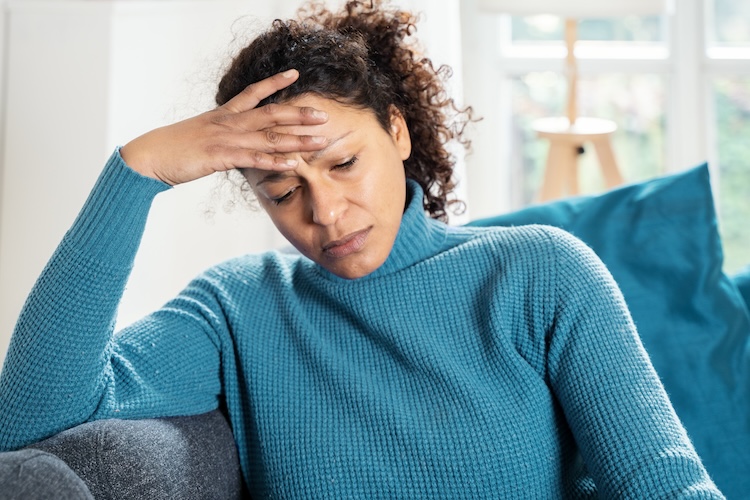Services
- Home
- Mental Health Services
- Who We Treat
- How We Treat
- Patients & Visitors
- About
close
Has a panic attack made you feel like you’ve lost control over your life, and do you worry that another one is just around the corner?
A panic disorder is a common type of anxiety disorder. In 2020, 80,964 people in Texas were diagnosed with an anxiety disorder. At SUN Behavioral Health Houston, we solve unmet needs through panic disorder treatment. Our no-cost care assessment allows people to meet with a representative as they determine the best panic disorder treatment plan for their unique needs. We will work with you and your doctors to determine the best plan of action that meets your needs.
People who experience frequent panic attacks may have a panic disorder. They often come with fear, discomfort, and feeling as if they are losing control – despite there being no danger or trigger. Experiencing panic attacks does not mean you have a panic disorder; however, those who do may worry that they will have another panic attack or change their life to avoid having one.
By receiving treatment for a panic disorder, you will be able to regain a feeling of control over your life. At SUN Behavioral Health Houston, our mental health services offer inpatient and outpatient programming. Our team will work with you to determine which programming would be best for your needs.


Our inpatient program is available for children, adolescents, adults, and geriatrics. We also offer a specialty women’s unit that provides an environment of healing and care to those seeking gender-specific treatment. Typically, patients stay in our inpatient care for 7 to 14 days.
Our outpatient programming includes partial hospitalization (PHP) and intensive outpatient (IOP) programming. Adults can participate in PHP and IOP groups that cover mental health and co-occurring, while adolescents can cover mental health at both the PHP and IOP levels. Adolescents also can attend PHP and IOP in the evening. This evening service is available both in person and virtually.

By attending treatment for panic attacks, you can achieve an improved function in your daily life.
Medications can be helpful when it comes to reducing the symptoms of panic attacks. Most commonly, medical professionals will prescribe selective serotonin reuptake inhibitors (SSRIs), serotonin and norepinephrine reuptake inhibitors (SNRIs), and benzodiazepines.
This type of psychotherapy helps patients identify stressful life events before symptoms of a panic disorder occur.
Using both medication and psychotherapy to treat panic disorder can be a practical option, as they can result in decreased symptoms when panic attacks occur while also gaining the skills necessary to prevent panic attacks from happening in the future.
Lifestyle changes can help lower someone’s chances of experiencing a panic attack. For example, caffeine and alcohol can worsen panic attack symptoms, so avoiding them lowers the risk of a panic attack occurring. Also, exercise and a healthy diet can help manage stress and lower the frequency of panic attacks.
Many causes exist for why a panic disorder may develop. For example, genetics can play a role, but panic disorder can also result from stress and environmental factors. Common environmental factors may include traumatic events and significant changes in their life.
Common signs and symptoms of a panic disorder include:
A panic attack is a sudden and temporary feeling of fear and physical reactions as a response to non-threatening situations. They are not dangerous or harmful, but for people who experience them frequently, they can result in concerns about the quality of their lives.
People who experience panic attacks will have them occur suddenly. Symptoms reach their peak within 10 minutes and then start to dissipate. Common symptoms of a panic attack include:
Only medical professionals can diagnose panic disorder. They will complete a physical exam, run blood work, and perform a psychological evaluation that explores your symptoms, fears, stress, relationships, and family history. To be diagnosed with a panic disorder, you must meet the following 3 conditions: frequent and unexpected panic attacks, symptoms not caused by a substance, medical, or other mental health disorders, and experiencing fear of another attack following one of your panic attacks.
With proper treatment, panic disorder can decrease with time. Without medical treatment, panic disorders may interfere with daily life.
Yes. Many people can live with panic disorder without medication. Participating in psychotherapy and applying life changes can significantly increase people’s quality of life.
SUN Behavioral Health Houston solves unmet needs in Houston, TX. Our crisis care includes 24/7 admission, allowing people to begin treatment while in crisis, no matter when it arises. If you have any questions, feel free to call 713-796-2273.